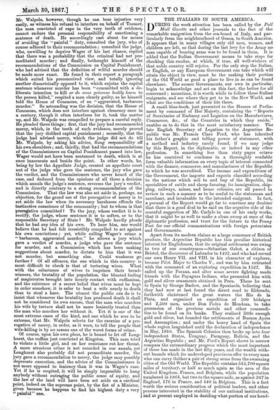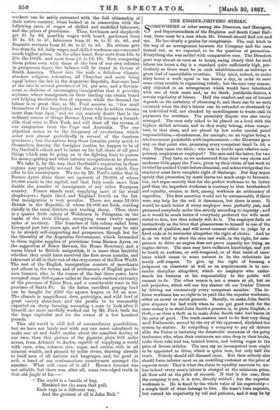'H t. ITALIANS IN SOUTH A MPRICA. D URING the week
attention has been called by the Pall Mall Gazette and other journals to the fact of the remarkable emigration from the sea-board of Italy, and par- ticularly from the neighbourhood of Genoa, to South America. It appears that in many villages only old men, women, and children are left, so that during the last levy for the Army no man capable of bearing arms was to be found in them. It is added that the Italian Government means to take steps for checking this exodus, at which, if true, all well-wishers of - that noble country will rejoice. For the only step the Italian, or English, or any European Government can take which will attain the object in view, must be the making their portion of the Old World as good a place to live in as can be found elsewhere. The sooner Governments, our own in particular, begin to acknowledge and act on this fact, the better for all- concerned ; meantime, it is worth while to follow these Italian emigrants, and see where they get to in the New World, and what are the conditions of their life there.
A small blue-book, just presented to the Houses of Parlia- ment by command of Her Majesty, containing the "Reports of Secretaries of Embassy and Legation on the Manufactures, Commerce, &c., of the Countries in which they reside," enables us to do this in the most satisfactory manner. The late English Secretary of Legation to the Argentine Re- public was Mr. Francis Clare Ford, who has inherited his father's graphic and telling power of statement, with a method and industry rarely found, if we may judge by this Report, in the diplomatic, or indeed in any other profession. In something less than sixty pages octavo- he has contrived to condense in a thoroughly readable form valuable information on every topic of interest connected with the finance, commerce, and manufactures of the Republic. to which he was accredited. The income and expenditure of the Government, the imports and exports classified according to the nations which sell to and buy of the Republic, its specialities of cattle and sheep farming, its immigration, ship- ping, railways, mines, and home colonies, are all passed in review in such a manner as to be useful to the statesman and merchant, and invaluable to the intended emigrant. In fact, a perusal of the Report would go far to convince any doubter- that there is a good deal to be said on the negative side of the - scornful suggestion of Mr. Carlyle in one of his early works, . that it might be as well to make a clean sweep at once of the diplomatic profession, and trust for the future to the Penny • Post for our official communications with foreign potentates and Governments.
Apart from its modern claims as a large consumer of British
produce, the Argentine Republic has this peculiar historical interest for Englishmen, that its origin-al settlement was owing to two of our countrymen—Sebastian Gabot, a citizen of Bristol, the discoverer of Labrador in 1497, and who had served our own Henry VII. and VIII. in his character of explorer, became Pilot Major to Charles V., and was by him entrusted with the command of an exploring expedition in 1527. He - sailed up the Parana, and after some severe fighting made - friends with the Payaguas Indians, who presented him with. gold and silver ornaments obtained in Peru. These he sent to Spain by George Barlow, and the Spaniards, believing that they had now at last found the direct road to Eldorado, forthwith christened the great waters the Rio de is Plata, and organized an expedition of 500 hidalgos and 2,500 men, under Don Pedro de Mendoza, to take possession of the precious metals and other commodi- ties to be found on its banks They realized little enough gold and silver, but founded the settlements of Buenos Ayres and Assumption ; and under the heavy hand of Spain the whole region languished until the declaration of independence in May, 1810. The Spanish Colonies then broke up into four independent States, Uruguay, Paraguay, Bolivia, and the Argentine Republic ; and Mr. Ford's Report shows in narrow compass the extraordinary progress which the most important of these has made in the last fifty years, and the wealth with- out bounds which its undeveloped provinces offer to every man who can carry thither a pair of strong arms from the swarming cities of the Old World. The Republic contains 515,700 square miles of territory, or half as much again as the area of the United Kingdom, France, and Belgium, while the population numbered in 1864, but two to the square mile, as against 347 in England, 176 in France, and 440 in Belgium. This is a fact worth the serious consideration of political leaders, and other persons interested in the stability of our national institutions, and at present employed in deciding what portion of our hand- workers can be safely entrusted with the full citizenship of their native country, when looked, at in connection with the following rates of wages of skilled and unskilled labourers, and the prices of provisions. Thus, herdsmen and shepherds get 3/. Os. 8d. monthly wages with board, gardeners from 4/. 2s. 6d. to W., labourers from 2/. 8s. to 3/. 6s. 8d., and domestic servants from 2/. 8s. to 3/. 6s. 8d. No artizan gets less than 6s. 8d. daily wages, and skilled workmen can command much higher prices. On the other hand, flour costs from 15s. to 20s. the 1001b., and meat from id. to 1 d. 11b. Now, comparing these prices even with those of the best of our own colonies in prosperous times, the balance will be found in favour of South America. Throw into the scale a delicious climate, absolute religious toleration, all Churches and sects being equal before the law in the Argentine Republic, first-rate land at the rate in several provinces of 9d. per acre, and a Govern- ment so desirous of encouraging immigration that it provides asylums, where immigrants on their landing can obtain board and lodging absolutely free of expense, while the demand for labour is so great that, as Mr. Ford assures us, "few avail themselves of this hospitality, and those who do seldom remain more than four days," and we can scarcely doubt that in the ordinary course of things Buenos Ayres will become a formid- able rival even to New York, and will draw off the stream of our emigration from the Cape and Australia. The one objection seems to be the frequency of revolutions, which occur now almost periodically in several of the fourteen provinces ; but the natives keep these luxuries pretty much to themselves, leaving the foreigner (unless he happen to be of the Garibaldi school, and to insist on his full share of all good things which may be going on in the fighting line) to pursue his money-getting and other inferior occupations as he pleases. We take it, by the way, that Garibaldi's reputation in these regions may partially account for the attraction which they offer to his countrymen. We see by Mr. Ford's tables that in Buenos Apes alone there are upwards of 70,000, of whom 40,000 reside in the capital, and that Italy sends more than double the number of immigrants of any other European country. France stands next, supplying most of the retail shopkeepers ; Spain third, and England fourth on the list. Our immigration is very peculiar. There are some 32,000 British in the Republic, of whom 28,000 are Irish, residing chiefly in the rural districts and tending sheep. Then there is a quaint little colony of Welshmen in Patagonia, on the banks of the river Chupat, occupying some twelve square miles of territory. The founders of this colony sailed from Liverpool just two years ago, and the settlement may be said to be already self-supporting and prosperous, though but for the liberality af the Argentine Government, which forwarded to them regular supplies of provisions from Buenos Apes, on the suggestion of Senor Rawson, the Home Secretary, and a warm friend to British emigration, it is more than doubtful whether they could have survived the first seven months, and taken root at all in their out-of-the-waycorner of the New World. The rest of the English immigration consists of merchants and others in the towns, and of settlements of English gentle- , men farmers, who, in the course of the last three years, have occupied some 600 square miles at the south-eastern extremity of the province of Entre Rios, and a considerable tract in the province of Santa Fe. In the latter, excellent grazing land can be bought for 250/. the square league, or 9d. an acre. The climate is magnificent, deer, partridges, and wild fowl of great variety abundant, and the profits to be reasonably expected on sheep farming, assuming a man to look after it himself, are most carefully worked out by Mr. Ford, both for the large capitalist and for the owner of a few hundred pounds.
This old world is still full of extraordinary possibilities, but we have not lately met with any one more calculated to make one sit and build castles about the manifest destiny of our race, than this picture of the gigantic plain 900 miles across, from Atlantic to Andes, capable of supplying a world with corn, wine, tobacco, rice, sugar, and cotton, rich in all mineral wealth, and pierced by noble rivers, drawing already to itself men of all nations and languages, and, for good or evil, a band of our contumacious countrymen amongst the number. What will come of it all? Byron's forecast was not reliable, but there was, after all, some two-edged truth in that old jingle of his :— "The world is a bundle of hay,
Mankind are the asses that pull, Each tugs in a different way,
And the greatest of all is John Bull."



































 Previous page
Previous page